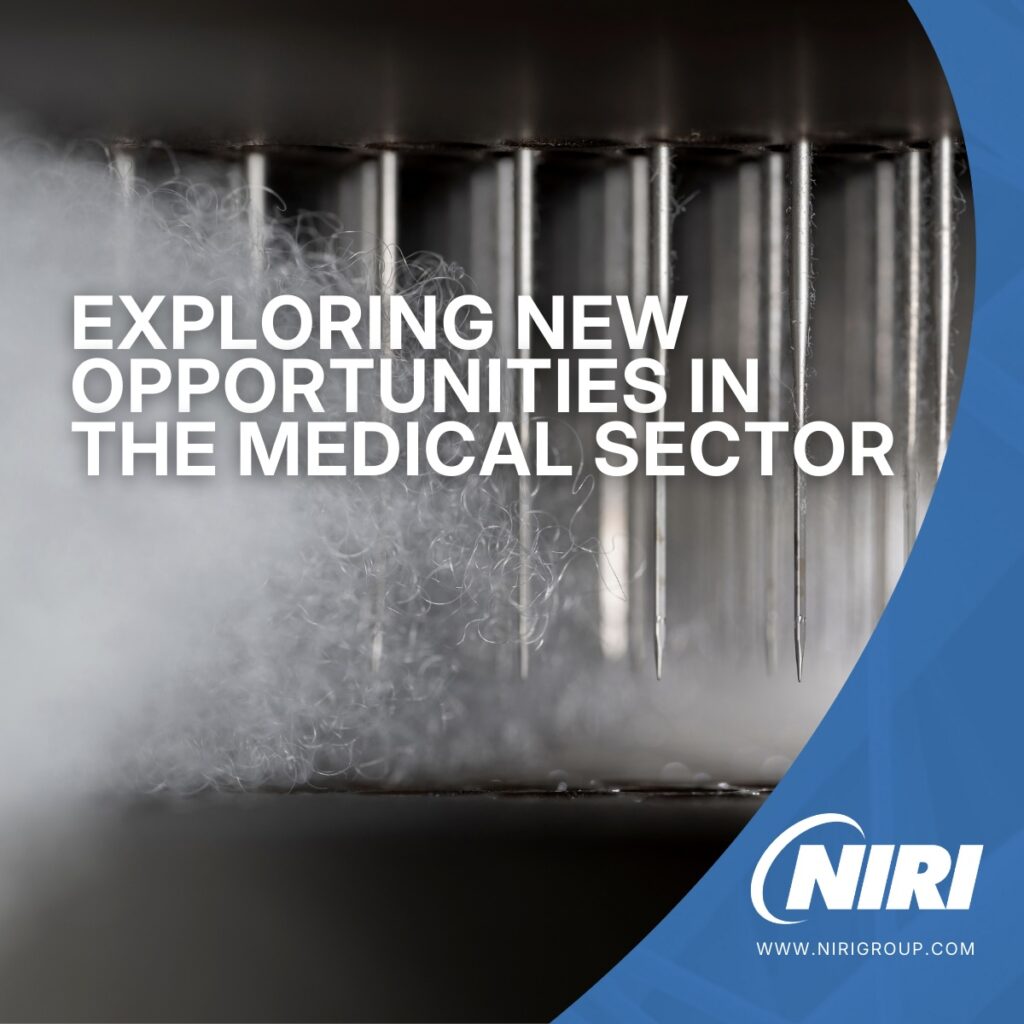
Economic headwinds in traditional textile and related markets are being faced by many businesses. To combat this, uncertainty can be turned into opportunity through targeted product innovation and diversification into new application areas. The medical sector can be reasonably resilient during economic downturns, providing attractive opportunities for technical innovators with an awareness of the needs of patients and healthcare providers, the regulatory landscape and the performance limitations of existing products.
Current Challenges for Manufacturers
Globally, textile and related businesses are contending with inflationary pressures, geopolitical tensions, and shifting consumer behaviour. The uncertainty in some supply chains, coupled with rising material and energy costs, has disrupted traditional business models. Tightening environmental regulation is a further challenge in some markets, affecting the ways products need to be designed, manufactured and quantitatively measured. At the same time, the medical sector is providing pockets of resilience with numerous healthcare products and medical devices now relying on the properties of fibres and engineered textile materials to perform.
Opportunities in the Medical Market
Despite continued economic uncertainty, the medical sector stands out as a robust and largely recession-proof market. Products incorporating textile materials for supporting healthcare and hygiene as well as non-implantable, implantable and extracorporeal medical devices are enabling patient outcomes and reduced morbidity to be achieved in a variety of healthcare settings, whilst delivering attractive margins and costs-in-use. Preventative treatments, diagnostics, remote patient monitoring, wearable technology and products for personalised healthcare are just some of the areas where textile materials are finding new applications to improve patient outcomes, both in medical and community settings. Changes in regulation also open new avenues for innovating, creating new products to deal with performance deficits in currently available products. Although not previously a major driver of innovation in this sector, sustainability concerns and the reliance on single-use plastics for hygiene and infection control has become an area of development.
Diversifying into the medical sector comes with a unique set of challenges and they vary depending on the country involved, and the specific way in which its healthcare system operates. Product classifications, costs, margins and regulatory compliance are naturally of major importance, but so too is understanding the needs of healthcare professionals and patients, if new products are to provide real-world benefits. When faced with this opportunity, collaboration with external innovation specialists can be valuable, improving targeting, de-risking in-house R&D and accelerating progress towards the creation of competitive products. Access to the necessary prototyping facilities, testing and structure-property modelling can significantly reduce the timescale between concept and scale-up, reducing commercial risk.

How NIRI Can Support Market Diversification
At NIRI, we understand that entering new markets involves more than just producing a high-quality product.
As experts in fibrous materials development, the NIRI team has proven experience in medical textile product development, such as transdermal drug delivery systems, pharmaceutical filtration, advanced wound care, blood filtration and medical packaging. NIRI’s R&D services enable rapid prototyping and are tailored to meet the unique demands of the medical sector. NIRI provides bespoke market insights, awareness of medical market trends, a route to GMP compliant textile production, and knowledge of regulatory requirements and standards. Leveraging this understanding means that we can effectively communicate the unique benefits of a product and support go-to-market strategies.
With a proven track record of helping manufacturers diversify into medical applications, NIRI provides customised, confidential and strategic product development, which de-risks market entry and accelerates time-to-market all under complete confidentiality.

NIRI’s Application Development Process
Targeting Compelling Use Cases: The first step in market diversification is understanding where potential products fit. NIRI conducts in-depth analysis to identify medical applications suited to your existing materials, manufacturing capabilities and expertise. By evaluating market trends, regulatory requirements, economics and growth potential, we identify the most promising opportunities and provide the strategic support to explore them efficiently.
Product Prototyping and Manufacturing: NIRI manufactures lab-scale prototypes with quantitative performance specifications aligned with medical industry standards. Small-scale fibre and fabric manufacturing lines can be configured for GMP production, depending on requirements, e.g. for clinical trials or pre-production prototyping. We focus on producing scalable products that are cost effective, commercially viable and reliable and have the industry connections to create new supply chains.
Testing and Benchmarking: NIRI rigorously evaluates product performance in relation to existing benchmarks and competitive products.Our rapid evaluation and testing service reduces the gap between concept and prototype, helping to demonstrate a product’s unique advantages to stakeholders.
Value Proposition Development: A strong value proposition is critical when entering the medical market. NIRI works to define a product’s most relevant attributes and value, relevant to the perspectives of both customers and investors.
Samples and Quantitative Specifications: Whether to support discussions with potential customers, investors, or industry partners, relevant physical samples are essential for showcasing a product’s potential.
Seizing Opportunities in the Medical Sector
The medical sector offers opportunities for businesses seeking to innovate and grow during times of uncertainty, but targeted innovation and expert support is essential. Companies can leverage NIRI’s confidential development services, to navigate these opportunities with confidence and diversify into exciting new markets.
Working with NIRI enables companies not only to move much more swiftly, but also strategically, complementing your existing expertise and knowledge base to increase your competitiveness and range of product offerings. Don’t miss the opportunity to diversify and transform your innovation process.
Contact NIRI today to explore how we can help you to identify new opportunities in the medical sector.